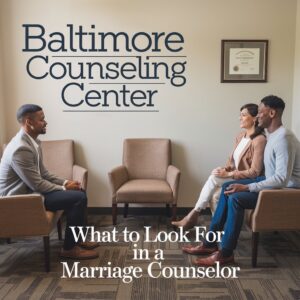Follow This Quality In a Therapist How to Find a Good Marriage Counselor for Couples
Are you and your partner struggling to communicate effectively? Has your relationship hit a rough patch that neither of you knows how to fix? Marriage counseling might be the solution you’re looking for. Couples therapy is designed to help partners reconnect, rebuild trust, and find healthier ways to navigate their relationship. But how do you find a good marriage counselor who can truly help?
In this article, we’ll cover everything you need to know about finding the right therapist for your relationship, including what to look for, questions to ask, and the different types of therapy available. Read on to discover how the right guidance can save and strengthen your marriage.
If You Need Couple Counseling In Baltimore Click Our Marriage Counseling Service
What Is Marriage Counseling for Couples?
Marriage counseling, or couples therapy, is a type of psychotherapy that focuses on helping couples recognize and resolve conflicts in their relationship. It involves working with a licensed therapist to improve communication, rebuild trust, and develop healthier coping strategies. Whether you’re married or in a long-term relationship, couples therapy can help both partners gain a better understanding of each other’s needs and work through challenges together.
Common Goals of Marriage Counseling:
- Improved Communication: Learning how to express thoughts and feelings openly without triggering arguments.
- Conflict Resolution: Discovering healthier ways to resolve disagreements.
- Rebuilding Trust: Addressing and healing from breaches of trust such as infidelity or dishonesty.
- Strengthening Intimacy: Finding ways to reignite emotional and physical closeness.
Types of Couples Therapy
Different couples face different issues, which is why there are various therapy models that cater to specific relationship needs. Here are some of the most common types of couples therapy:
- Emotionally Focused Therapy (EFT): This approach helps couples uncover deep emotional needs and learn to respond to each other with empathy.
- Cognitive Behavioral Therapy (CBT): Focuses on changing negative thought patterns and behaviors that contribute to relationship stress.
- Gottman Method: Based on decades of research, this method focuses on improving communication and emotional connection.
- Imago Relationship Therapy: Emphasizes healing childhood wounds that impact adult relationships.
- Solution-Focused Therapy: Concentrates on finding solutions for immediate relationship problems rather than dwelling on past issues.
Each type of therapy offers a different approach, and a good therapist will tailor their methods to your unique needs as a couple.
When Should You Consider Couples Counseling?
Every relationship has ups and downs, but there are certain situations where seeking professional help becomes necessary. If you’re experiencing any of the following, it may be time to consider couples counseling:
- Constant Arguing: Disagreements that never seem to resolve or turn into bigger conflicts.
- Lack of Intimacy: Emotional or physical distance that’s driving a wedge between you.
- Trust Issues: Infidelity or dishonesty that’s left unresolved.
- Communication Breakdown: When conversations are more frustrating than constructive.
- Major Life Transitions: Significant changes such as moving, starting a family, or career changes that are causing strain.
- Considering Divorce or Separation: Counseling can help you explore whether separation is the right choice or if the relationship can be salvaged.
If these issues resonate with you, couples therapy can offer tools to navigate these challenges and create a stronger relationship.
What to Look for in a Marriage Counselor

Choosing the right marriage counselor is crucial to the success of therapy. Here’s what you should consider:
- Experience and Credentials: Look for a therapist who is licensed and has extensive experience working with couples. Common licenses include LMFT (Licensed Marriage and Family Therapist), LMHC (Licensed Mental Health Counselor), and LCSW (Licensed Clinical Social Worker).
- Specialization in Couples Therapy: Not all therapists specialize in working with couples. Be sure your counselor has specific training and a track record in marriage counseling.
- Effective Communication Style: Your therapist should be someone who communicates clearly and makes both partners feel heard.
- Positive Reviews or Testimonials: Check for reviews from other couples who have worked with the therapist to gauge their success rate.
How to Interview a Potential Couples Therapist
Once you’ve found a few potential counselors, it’s important to interview them to make sure they’re a good fit. Here are some questions to ask during the consultation:
- What is your experience working with couples who are facing our type of issues?
- What therapeutic approaches do you use?
- How do you handle situations where one partner is more resistant to therapy than the other?
- How long do you expect therapy to last?
- What outcomes can we expect from working with you?
Does Counseling Really Help Marriages?
The effectiveness of marriage counseling depends on several factors, including the willingness of both partners to work on the relationship and the skill of the therapist. Studies show that about 75% of couples who undergo counseling see improvements in their relationship. That being said, counseling isn’t a magic fix, and it requires commitment and effort from both parties to see lasting results.
Common Types of Marriage Counselors:
Licensed Marriage and Family Therapist (LMFT)
LMFTs specialize in working with couples and families. They are trained to identify relationship patterns and help partners develop healthier interactions.
Clinical Psychologist (CP)
A Clinical Psychologist may focus on addressing deeper psychological issues that might be affecting the relationship, such as depression, anxiety, or past trauma.
Psychologist (Ph.D. or Psy.D.)
A psychologist with either a Ph.D. or Psy.D. can provide both individual and couples therapy, helping partners navigate complex emotional issues.
Licensed Mental Health Counselor (LMHC)
LMHCs are trained to support individuals and couples with emotional and mental health concerns, often focusing on communication and relationship dynamics.
Licensed Clinical Social Worker (LCSW)
LCSWs often work with couples who may be dealing with external stressors such as family issues, social pressures, or economic difficulties.
How to Choose a Marriage Counselor: Key Considerations
Start the Search Online and Offline
Use online directories like Psychology Today, personal referrals from friends or family, or local community centers, And Google My Business Or Websites to find reputable marriage counselors.
Choose a Counselor with the Right Qualifications
Ensure the therapist holds appropriate licenses, certifications, And Previous Therapy Service results from Positive Feedback, and experience in couples therapy.
Your Counselor Should Be Unbiased and Neutral
Find an Experienced counselor for Couple Therapy who will remain neutral, offering equal support to both partners and avoiding favoritism.
Find a Counselor with Similar Belief Systems
Consider whether you want a therapist who shares or respects your cultural, spiritual, or religious beliefs. A counselor with similar values may better understand your worldview.
Focus on Counseling Solutions, Not Just Costs
While therapy can be expensive, prioritize the counselor’s experience and potential outcomes over the cost. Look for sliding-scale options if cost is a concern.
Check Their Availability and Location
Ensure that the counselor’s availability fits your schedule and that the Your Near location is convenient. Many therapists now offer Any Time virtual sessions, which can add flexibility.
Compare Costs of Therapy
Be upfront about the costs of therapy. It’s important to know what you’re committing to financially and compare prices between counselors.
Learn About Problem-Solving Techniques Offered
Find out what kind of problem-solving techniques the therapist uses and ensure they align with your needs.
Be Patient with the Treatment Process
Couples therapy can take time. Results aren’t always immediate, but with patience and persistence, you’re likely to see progress over time will recover within 15 – 20 sessions
Common FAQs About Marriage Counseling
Can Marriage Counseling Save a Marriage?
Yes, marriage counseling can save a marriage, especially if both partners are committed to improving the relationship. However, success depends on both partners being open to change.
Does Marriage Counseling Work?
In many cases, yes. Research suggests that most couples see significant improvement after therapy. The key is finding the right therapist and being consistent with sessions.
What Percentage of Marriages Are Saved by Therapy?
Approximately 70-75% of couples report positive outcomes from marriage counseling, although success rates can vary depending on the therapist and the couple’s level of commitment.
Do Marriage Counselors Ever Recommend Divorce?
While marriage counselors focus on reconciliation, there are times when they may suggest separation or divorce if they believe it’s the healthiest option for both partners.
Is Marriage Counseling Good or Bad?
Marriage counseling is generally a good option for couples struggling with conflict or disconnection. However, success depends on the therapist’s expertise and the couple’s willingness to engage in the process.
What Is the Main Problem in Marriage Counseling?
One of the main challenges is when one partner is less committed to therapy than the other. This can hinder progress and make it difficult to achieve positive outcomes.
Ready to Start Couples Counseling?
If you and your partner are ready to take the next step toward a healthier, happier relationship, consider reaching out to a qualified marriage counselor today. Finding the right therapist can make all the difference in saving your marriage and rebuilding a lasting connection. Take the first step and start your search today!

